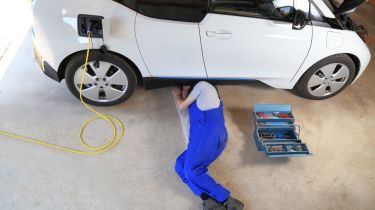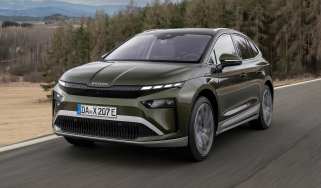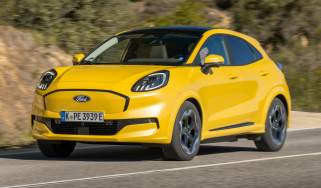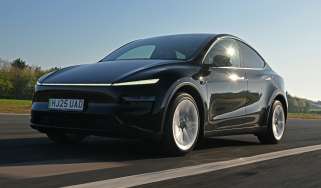Electric car repairs, servicing and maintenance: a complete guide
How, where and when should you get your electric car serviced? And does the process differ in any way from combustion vehicles? Find out here…

There are many benefits of electric cars, one of the most practical being that they generally require less maintenance, and less often, than petrol or diesel vehicles. The main reason for this is that electric cars have far fewer moving parts under the bonnet, which makes upkeep a simpler task. However, regular servicing is still essential – not only to maintain your car’s manufacturer warranty, but also to ensure safety and peace of mind. Here’s everything you need to know about electric car servicing and maintenance.
Electric car servicing: general information
If you’ve owned a petrol or diesel car before, you’ll be familiar with the routine of regular, scheduled servicing. Electric cars have a similar structure, although the maintenance needs and schedule often differ. Generally speaking, electric vehicles need less frequent servicing, which can lead to lower running costs.
For example, the Vauxhall Corsa Electric only requires a service every two years or 16,000 miles, compared with every 12 months or 12,500 miles for its petrol counterpart. While EVs generally mean fewer trips to the dealer, neglecting essential items, like tyres or wipers, can still leave you with unexpected expenses or a MOT failure. So regular checks on these items are still essential.
Service schedules are available from your local dealer or directly from the manufacturer. Sticking to these schedules not only keeps your car in top condition, but also protects any remaining warranty, giving you one less thing to worry about.
Additionally, EVs often have fewer fluid-related checks and part replacements. With the absence of engine oil changes and the reduced brake wear thanks to regenerative braking, your trips to the garage may be cut nearly in half.
Which parts of an electric car need servicing?
Despite their simpler mechanics, EVs still need regular servicing. Unlike a traditional engine packed with hundreds of parts, such as spark plugs, oil filters and coolant systems, electric cars are much more straightforward. However, they still need to roll, turn and stop, so they share some service requirements with petrol and diesel cars. Key service areas include brakes, suspension, tyres, steering (including tracking), lights, wipers and cabin filters. It’s also worth noting that hybrid and plug-in hybrids do have an engine, and thus need the same checks as a petrol or diesel model.
Additionally, many manufacturers provide over-the-air (OTA) software updates, which can add improvements like greater range or performance without a physical dealer visit. However, some more substantial updates or diagnostic tests still require you to bring the vehicle in.

EV brake maintenance and regenerative braking
Electric cars also reduce brake wear thanks to regenerative braking, which helps recover energy when slowing down. This means the brakes often last much longer than on traditional vehicles, especially in city driving, where frequent stopping might otherwise lead to quicker wear.
Regenerative braking also contributes to overall efficiency, allowing you to get more miles out of a charge. That said, it’s still important to have the brake system checked regularly. Over time, brake fluid degrades, and components such as brake pads and discs will eventually wear, so don’t assume they’ll last indefinitely.
Where to get an electric car serviced
When it comes to servicing your electric vehicle (EV), the best place to start is often with a manufacturer-approved dealer. These have the specialist tools and expertise to work on your car, ensuring that any work carried out is in line with the manufacturer’s standards. For instance, if you own a Tesla, you can take your car to an official Tesla Service Centre, where technicians are specifically trained on the company’s unique systems and software. Plus, with some manufacturers offering the convenience of mobile servicing, a technician may even come to your home for certain maintenance tasks.
For those with a used EV or anyone looking for an alternative to main dealers, many independent garages are becoming increasingly qualified to work on electric vehicles. The Hybrid and Electric Vehicle Repair Alliance (HEVRA) has built a network of garages that are specifically equipped to handle EVs. These are vetted for the right tools, training and technical support, so you can rest assured your car is in safe hands. HEVRA’s directory covers a wide range of locations across the UK, from cities to more rural areas. A quick search on the HEVRA website shows several around the London area, including garages in Park Royal, South Wimbledon and Croydon. For those living further afield, HEVRA’s directory includes garages all across the UK, anywhere from Scotland to the Channel Islands.
Electric-car servicing plans
As with traditional cars, owners of electric vehicles often get offered service plans from the dealers, which cover basic maintenance. While consumables like tyres and brakes may not be included, essentials such as brake fluid and battery health checks are typically covered. Manufacturers usually offer plans lasting from two to five years, with options to pay upfront or monthly. These plans can help with budgeting, especially if you prefer spreading out the cost instead of paying for each individual service.
An all-inclusive service plan won’t always cover wear-and-tear items, so double check what’s included if you’re taking out a plan. Some cover everything from brake fluid changes to essential software updates, while others may require you to handle certain costs yourself.
Of course, you can also pay for a one-off service, although this is likely to cost you slightly more per service than if you were to take out an annual or pay-monthly plan.
Electric-car service intervals
EVs often have longer intervals between services compared with their petrol and diesel counterparts. Fewer moving parts mean less wear and tear, which can save you money in the long run. For example, the Hyundai Kona Electric requires its service to be completed every two years or 20,000 miles, whereas the petrol model demands servicing every 12 months or 10,000 miles.
With the growing popularity of over-the-air updates, EV servicing could become even simpler in future. Many updates to your EV’s systems – from entertainment software to battery and range improvements – can now be installed remotely, without needing to set foot in a garage.
On the other hand, the Tesla Model Y – as well as the Model 3, S and X – doesn’t have a fixed service schedule. Instead, the car will notify you via the infotainment screen when it is due a service; you can schedule and alter an appointment all via the Tesla app, with the option of going to your local Tesla Centre, or having the technicians come to you.
Electric-car servicing vs hybrid servicing
EV servicing is generally simpler and cheaper than for petrol or diesel models, as there are fewer components that wear out or need replacing. However, hybrids require more extensive servicing, as they have both an engine and electric motor. Expect similar costs to regular petrol or diesel cars for hybrid maintenance. Since hybrids blend both engine and electric power, they typically require spark plugs, oil, coolant, belts and pulleys – the full list that comes with an internal-combustion engine.
Some manufacturers, such as Vauxhall, make things a bit easier, grouping hybrids with EVs when it comes to servicing costs. This helps offset the price of routine maintenance, especially for those who rely on hybrids for daily commutes and frequent journeys.
Electric-car service costs
Servicing an EV is often cheaper due to the less complex powertrain and fewer moving parts. However, make sure to run the numbers; longer service intervals may mean costs even out over time, despite fewer visits. While traditional service intervals for petrol and diesel vehicles are often annual, EVs typically need fewer scheduled check-ups, which can make service plans even more attractive.
As with any vehicle, specific costs will vary depending on your car’s make and model, but EV drivers can generally expect lower bills compared with conventional cars.
Electric-car servicing: exclusions
Like any car, an electric car service excludes certain items. Consumables such as tyres will be checked but only replaced at the owner’s expense, while fluids typically receive a visual inspection. If any major issues come up, you’ll be informed and given repair options – although warranty and service plans might cover certain costs.
Also, not every electric car service plan will include battery care. Batteries are checked for overall health, but actual repairs or replacements are generally subject to a different warranty. And as with any car, an unexpected fault may lead to costs that aren’t covered by regular servicing or warranty agreements.
Electric-car batteries and servicing
Most EVs have an independent battery warranty that often lasts longer than the general car warranty. For instance, the BMW i4 has a three-year manufacturer warranty with unlimited mileage but an eight-year/100,000-mile battery warranty. This additional coverage can bring peace of mind, especially given that batteries are among the most expensive components of an EV.
Battery health checks are usually part of every service, with a detailed report on the state of health (SoH) provided. While most EV batteries are built to last, extreme climates and high-mileage use can impact battery life, making regular checks all the more important for keeping tabs on your car’s longevity.




